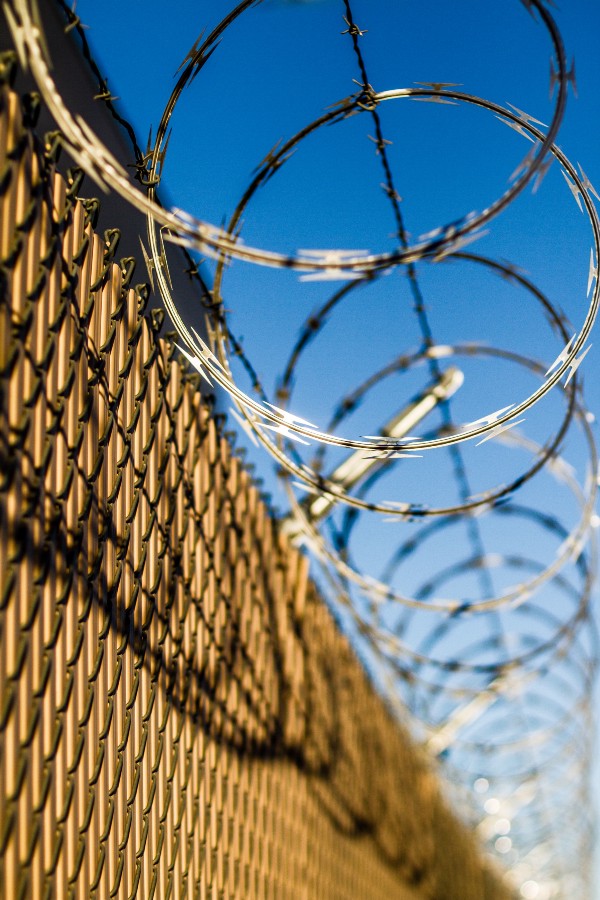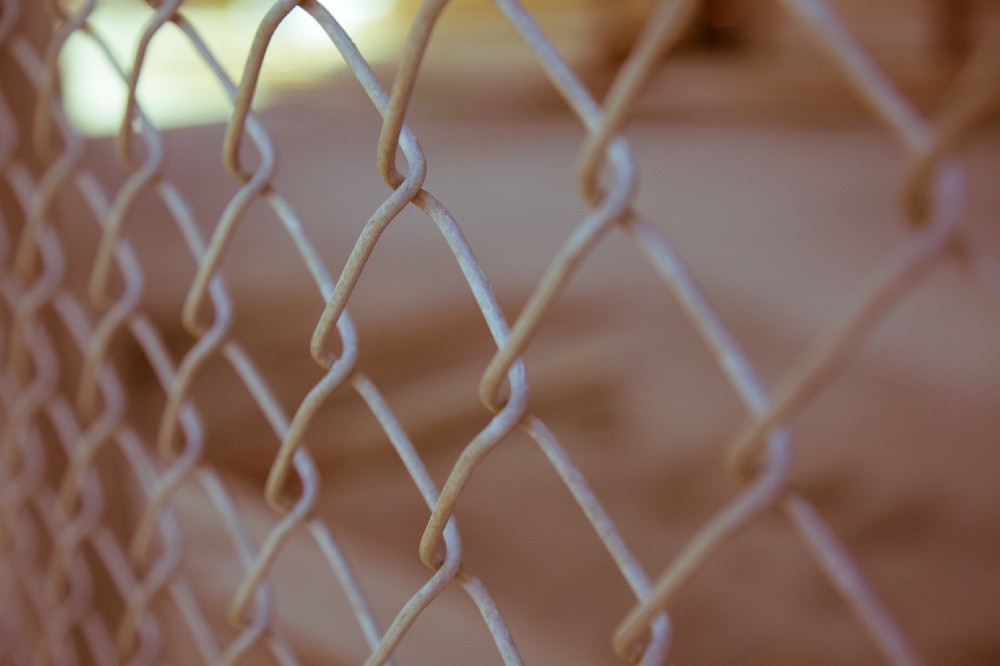
There are 11 locked doors between my car and the gymnasium where I sat and listened. 11 doors in, 11 doors out. Each one locked and controlled by a nameless, faceless guard. Some of them opened without delay, others required that my group be herded all together, to have a door behind us close, before the one in front of us would open. 11 doors. The sound of the doors closing and locking, a thud and click mixed together.
The people I was going to see, some of them will never go out those 11 doors. They are inmates in Sussex II correctional facility in Waverly, Virginia. Sussex II isn’t a low-level, minimum security prison. It houses men who are in for life sentences. Sentences like that don’t get handed down for embezzlement or check fraud. They made decision, or were victims of circumstance, that landed them there, and I am unnerved by it.
Before I went through the first locked door, I had a sinking feeling as I drove out to the prison. An hour and a half on roads leading to an increasing rural part of the state, I kept wondering what would happen if I broke down, how long would it take for a tow truck to get to me. I tried to distract myself, but driving alone, there is time to think. When I turned on the road that lead to the prison, it was looming over the trees, closer than I would have thought. I had lived near prisons before. Living in Lansing, Kansas, my room was closest to the Lansing Correctional Facility. At night, there was never darkness in my room, the glow of the prison lights always kept my room softly illuminated. It was never quiet, communication over loud speakers would break the normal suburban background noise. Lansing and Leavenworth, Kansas are home to at least 4 prisons and associated facilities, including the United States Disciplinary Barracks, the only maximum security prison for the US military. Maybe being around prisons during my teen years, set me up for the feeling in my gut. Maybe it was my binge-watching prison documentaries in college. Either way, seeing the plain block buildings rising over the trees, I was filled with a minor chord of dread. That is probably intended for those who will be there for a stay, not for the visitors.
I was going to Sussex II with Kairos, a Christian prison ministry organization. I was going to participate in the closing ceremony for a Kairos retreat. Kairos’ mission is to: “share the transforming love and forgiveness of Jesus Christ to impact the hearts and lives of incarcerated men, women and youth, as well as their families, to become loving and productive citizens of their communities”, and I was introduced to it through the church bulletin. “We need 600 dozen cookies,” leads to questions, and I inquired. The answer I got was to come to prison and see the closing ceremony, to see if it was a ministry I wanted to participate in. It was a month away, so I didn’t think much of it. The Sunday before the date, Esther and the kids baked 6 dozen peanut butter cookies, a minor contribution to such a monstrous task. In the recipe for the cookies, one of the most important ingredients is prayer, each batch of cookies should have prayer for the people who will eat them added. I haven’t been one to talk about adding prayer to my work, but I know that Esther and the kids did say a prayer that I helped lead before commencing baking.
Six dozen peanut butter cookies. A drop in the bucket of 600 dozen cookies, but it was our contribution.
Sunday arrived. I read the prayers of the people at the 8 a.m. service which included a prayer for the Kairos team, who had been working in the prison since Thursday. After church I came home, ate a light lunch and got ready to go. What does one wear to a prison ministry? The regulations for wardrobe are very specific for women, skirts no higher than four inches above the middle of the knee, no pants that are excessively tight, no tops that have thin straps. For men, the regulations are less specific. A few guidelines, but not nearly to the level of women. I wasn’t sure what I should wear, the clothes I wore to church? A suit? Jeans and a polo? I decided for a button down shirt and jeans. I slipped on my shoes and started driving. One and a half hours there. Time to think.
The instructions indicated that I should arrive by two o’clock, so when I parked at half past one, I sat in my car, looking over the parking lot, at the grey buildings situated behind multiple fences and razor wire. I emptied my pockets, removed my wedding ring, and shoved it all in my glove box. I knew I wouldn’t have the option to bring my pocket’s content in, not that I was carrying a lock pick set, or pocket knives. I brought my drivers license and my car key. And having left my phone in the car, I felt naked. It isn’t that I haven’t been without my phone before, I leave it when I workout, or when I need it on the charger, but in this instance I didn’t know what I was going to be doing or where I was going, so with my lifeline to the outside world left in the glove box of my locked car, I felt vulnerable. In a way that I don’t normally feel.

11 locked doors. The first one seemed innocent enough, a door to the visitor welcome center. I tried pulling it open, but it was locked. A guard at the visitor welcome center desk needed to press a button to let the magnetic lock on the door release. There were people milling about in the welcome center and more joined as I stood and waited for our group to be allowed entrance. As more people came to the door, the people inside wanted to help by opening the door, not realized that the door was not under their control. They smashed on the crash bar, thinking that if they hit it just a little bit harder that they would overcome some mechanical fault in the door, allowing it to swing open for the people waiting outside. They didn’t know that they were not in control. That was one thing a parishoner said to me when I expressed interest in going to this ceremony: “As long as you remember that you are not in control, things will work out okay.” Not particularly comforting when it comes to locked doors, but I think it is a much deeper statement than even the parishoner had intended.
While I was waiting, I saw several people turned away for their clothing. They were not happy. I imagine that some of these people travelled quite a distance to see their loved ones and to be turned away for fashion that is accepted in the outside world must be frustrating. Knowing that you aren’t going to get an opportunity to see your loved one for another week, or longer, because of someone’s judgement about your clothes, can’t be easy.
As we are waiting, the person from my church that leads our Kairos ministry, Jim, said that I might have a problem. I thought it was because I didn’t fill out some paperwork, or my beard or haircut violated some unknown to me rule. “Well,” Jim tell me, “I should have told you not to wear blue jeans.” I am curious, I’m sure I screwed my face into a question. He explained that with a light blue button down shirt and blue jeans that I was dressed like an inmate and that because of that the guards might not let me in. I hung my head in shame, I probably missed that part of the dress code.
I didn’t know if I would be let into the sallyport with the rest of our group. The twenty of us were broken up into groups of 5 to go through what can only be described as a TSA style screening with the optional “enhanced screening”: X-ray machines, metal detectors, and pat downs. The last part of the entrance procedure was to hand over our driver’s license. If I was dressed like an inmate, isn’t that the last shred of evidence that I wasn’t scheduled for a longer stay? What would stop a guard from pulling me away from the group or questioning why an inmate was headed toward the exit? “As long as you remember that you are not in control, things will work out okay.”
While inside, past the 11 locked doors, I did look like a resident. I was nervous that I would be stopped when I tried to leave. But I also realized that while I wasn’t in control, there was a higher power working there. The stories that I heard from the men there were personal and moving. They truly experienced a growing connection with God, and built an accountability with other men. They kindled friendships, they broke down barriers and got cookies. The cookies draw them, the message keeps them.
I blended in while I was inside, and it made for a humorous story, but I got to exit. Through the 11 doors, no questions. The men who didn’t get to exit, they got something, something that I hope I can attain, with out the need for so many locked doors, a closeness to God.